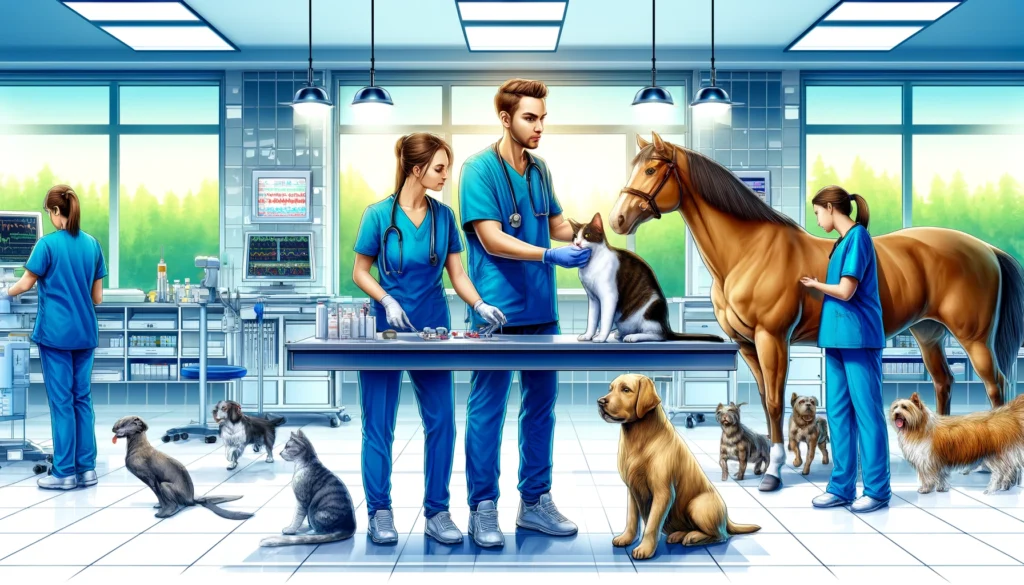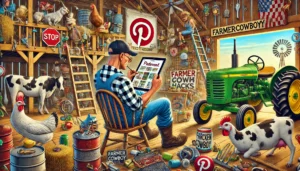
Animal Health Definition A detailed vivid illustration of a veterinarian examining a variety of animals in a clinic setting. The scene includes a dog a cat and a horse eac 2.webp.webp
Veterinary Medicine
Definition:
Veterinary medicine encompasses the multidisciplinary field of healthcare focused on the diagnosis, treatment, prevention, and management of diseases, injuries, and disorders in animals. Veterinarians, or veterinary medical professionals, play a central role in safeguarding the health and welfare of a wide range of animal species, including pets, livestock, wildlife, and exotic animals. Veterinary medicine encompasses various specialized disciplines, including clinical practice, public health, research, education, and regulatory oversight.
Importance of Veterinary Medicine:
- Animal Health and Welfare: Veterinary medicine is fundamental to promoting and maintaining the health, well-being, and quality of life of animals under human care. Veterinarians provide essential medical care, preventive services, and behavioral support to ensure optimal physical and psychological health in companion animals, production animals, and wildlife populations.
- Public Health Protection: Veterinary medicine plays a critical role in safeguarding public health by monitoring and controlling zoonotic diseases, which can transmit between animals and humans. Veterinarians collaborate with public health agencies to identify and mitigate disease risks, implement surveillance and control measures, and promote safe food production and consumption.
- Food Safety and Security: Veterinary medicine contributes to ensuring the safety and security of the food supply by overseeing the health and welfare of food-producing animals and monitoring for potential hazards or contaminants in animal products. Veterinarians conduct inspections, audits, and quality assurance programs to maintain high standards of food safety and compliance with regulatory requirements.
- One Health Approach: The concept of One Health recognizes the interconnectedness of human, animal, and environmental health and emphasizes collaborative approaches to address complex health challenges. Veterinary medicine plays a key role in One Health initiatives by fostering interdisciplinary collaboration, disease surveillance, and research to address emerging infectious diseases, antimicrobial resistance, and environmental health threats.
Veterinary Education and Training:
- Academic Curriculum: Veterinary education encompasses a comprehensive curriculum covering basic sciences, clinical skills, animal behavior, pathology, pharmacology, surgery, and public health. Veterinary students undergo rigorous academic training, laboratory exercises, and clinical rotations to develop diagnostic, therapeutic, and preventive care competencies across diverse animal species and healthcare settings.
- Clinical Experience: Hands-on clinical experience is integral to veterinary education, allowing students to apply theoretical knowledge in real-world practice under the supervision of experienced veterinarians. Clinical rotations in veterinary teaching hospitals, private practices, and specialty clinics expose students to a wide range of clinical cases and diagnostic procedures, enhancing their clinical reasoning and problem-solving skills.
- Specialized Training: Veterinarians may pursue additional training and certification in specialized fields of veterinary medicine, such as internal medicine, surgery, dermatology, oncology, dentistry, and emergency medicine. Specialty board certification programs require extensive postgraduate training, clinical experience, and examination to demonstrate expertise in specific areas of veterinary practice.
Veterinary Practice and Services:
- Companion Animal Care: Veterinary clinics and hospitals provide comprehensive medical, surgical, and preventive care services for companion animals, including dogs, cats, birds, and exotic pets. Services may include wellness exams, vaccinations, spaying/neutering, dental care, diagnostic imaging, internal medicine, surgery, and behavioral counseling.
- Livestock and Production Animal Medicine: Veterinarians working in livestock production systems provide herd health management, reproductive services, disease prevention programs, and emergency care for cattle, pigs, sheep, goats, poultry, and other food-producing animals. They collaborate with producers to optimize animal welfare, productivity, and sustainability in agricultural operations.
- Equine Medicine: Equine veterinarians specialize in the care and management of horses, providing routine health care, preventive medicine, lameness evaluations, dentistry, reproductive services, and emergency treatment for performance, sport, and pleasure horses. Equine veterinarians may work in private practices, racetracks, equestrian facilities, or mobile veterinary services.
- Wildlife and Conservation Medicine: Veterinarians specializing in wildlife and conservation medicine focus on the health, management, and conservation of wild animal populations and ecosystems. They conduct research, disease surveillance, and conservation initiatives to mitigate threats to wildlife health, biodiversity, and ecosystem integrity.
Conclusion:
Veterinary medicine plays a pivotal role in promoting animal health, public health, and environmental sustainability through comprehensive healthcare services, preventive programs, and interdisciplinary collaborations. By advancing knowledge, skills, and expertise in clinical practice, research, education, and public policy, veterinarians contribute to the well-being of animals, humans, and ecosystems, supporting the shared goal of fostering a healthier and more harmonious relationship between people, animals, and the environment.
Fall off the barn roof and busted your keister? Life on the farm or ranch can be tough on the bum. Need a break? Laugh it off at FarmerCowboy.com, the #1 farm humor site. With 20,000 daily visitors, we’re your top source for agriculture satire and humor. Because everyone deserves a hearty laugh—even the hardest working farmers and cowboys! Join us and turn those long days into fun tales at FarmerCowboy.com.
Originally posted 2011-07-13 15:24:50.
Originally posted 2024-06-21 13:53:36.
Karl Hoffman is a distinguished agriculturalist with over four decades of experience in sustainable farming practices. He holds a Ph.D. in Agronomy from Cornell University and has made significant contributions as a professor at Iowa State University. Hoffman’s groundbreaking research on integrated pest management and soil health has revolutionized modern agriculture. As a respected farm journalist, his column “Field Notes with Karl Hoffman” and his blog “The Modern Farmer” provide insightful, practical advice to a global audience. Hoffman’s work with the USDA and the United Nations FAO has enhanced food security worldwide. His awards include the USDA’s Distinguished Service Award and the World Food Prize, reflecting his profound impact on agriculture and sustainability.



